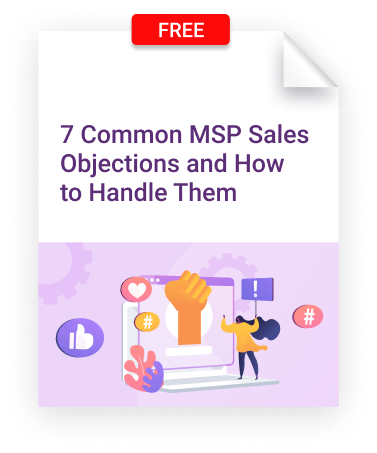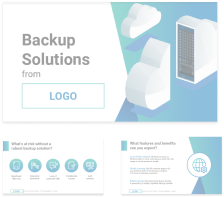MSP Business
Selling Backup as a Service: Guide for MSPs
In the MSP ecosystem, customers often lack the technical expertise to understand the managed services that MSPs offer.
That's only natural. After all, one of the most common reasons why customers hire MSPs is because they don't know how to provide IT services themselves.
But clients' lack of technical skills can also create a major barrier when it comes to selling managed services: because they don't understand how a service works, they struggle to see the value. Or, they underestimate its complexity and assume they can do it themselves, rather than outsourcing it to you.
To help respond to this type of sales barrier, let's take a look at strategies that MSPs can adopt to convey the value of one common type of managed service: Backup-as-a-Service, or BaaS. This article offers tips on how to talk about BaaS with customers in a way that makes its value clear, but without getting so technical that clients become lost.

Start with a High-Level Overview
When discussing BaaS with clients, start by providing a brief, non-technical overview of what it entails, for example, a description like "BaaS means that your MSP takes full responsibility for backing up and, when necessary, restoring your critical business files."
At this point, you don't need to go into detail about different types of backups, backup storage options, and the like. Save those technical details for later in the conversation, if and when they become relevant.
Explain the Importance of BaaS
After introducing what BaaS entails, shift your pitch to focusing on the benefits.
Offering some basic statistics about the cost of data loss and related disruptions to small businesses is helpful for this purpose:
-
- Ransomware attacks cause an average of 16.2 days of downtime (Threatpost).
- An hour of downtime costs $8,000 for a small company (Datto).
- 47% of small businesses suffered at least one cyberattack in 2019 (Sagenext).
These are general data points to consider presenting. Ideally, you'll be able to collect the most up-to-date statistics, as well as ones tailored to the customer's particular vertical.
Further reading 17 MSP Statistics to Show the Value of Managed Services
On that note, your overall pitch about the importance of BaaS should be tailored to the customer's vertical. For example, here are some talking points to present for different industries:
- Insurance: Insurance firms typically handle extremely sensitive data. They are also at an ever-increasing risk of cyber threats and other data disasters. In addition, healthcare insurers in particular face the added complexity of maintaining HIPAA-mandated data confidentiality and other regulatory requirements.
- Educational institutions: With so many students, teachers, staff, and vendors having to collaborate and coordinate, accidental data deletion is almost impossible to prevent. This makes a reliable, systematic data backup solution critical.
- Construction: For construction companies, architecture firms, builders, and general contractors, data loss may lead to missed deadlines, faulty work, breached contracts, or even injuries to workers.
Further reading 5 Tips for Choosing Your Vertical
Explain How You Can Help with Data Backup Needs
After you've outlined the risks associated with data loss, you can explain the specific ways in which an MSP's BaaS offering addresses this risk by providing:
- Reliable backup of all of the company’s critical data.
- A fast and reliable recovery process (emphasize that BaaS includes not just backup, but also managed recovery when the need arises).
- Access to backup data anytime, from anywhere.
- Reduced risks of noncompliance due to failure to back up or otherwise protect critical data.
- A safeguard against the threat of ransomware (because backups can be used to restore data that is "taken hostage" by ransomware attackers). How are you talking to customers about ransomware?
- Keeping business growth on track by avoiding obstacles caused by data management bottlenecks.
Further reading Cloud Backup for Small Business
Explain Backup Options
Once you've walked through a high-level explanation of what BaaS entails and why it's important, you can drill down a little and provide some more technical information. Be careful not to go too far, but briefly cover topics such as:
- Local vs. cloud-based backup storage.
- Different types of backup: backing up individual files, entire systems, databases, virtual machines, and so on.
- Backing up SaaS platforms, like G Suite and Office 365.
The purpose of bringing up these technical details is not to give the client an in-depth lesson on how BaaS works. Instead, it is to convey to the customer that your BaaS offering incorporates technical sophistication, and can be tailored to meet clients' individual needs. This helps reinforce the value of the service.
Further reading What Is MSP Software
Overcoming the Objections
The final major step in pitching BaaS is to overcome common sales objections that customers have:
- No need to outsource data backup: Some customers believe they can manage their own data backups (or are already doing it). Emphasize that this is a poor approach in most cases, because clients lack the time, expertise and enterprise-level backup tools to deliver a reliable and streamlined backup experience. Clients also often lack the expertise required to restore data quickly (and it can be easy for them to forget that data recovery is just as critical as data backup).
- Too expensive: Clients may believe that the risk of downtime is not high enough to justify the cost of BaaS. Respond to this objection by revisiting statistics about the cost of data loss and downtime.
- Their data is already in the cloud: Customers who store their data by default in a cloud-based environment like Google Drive, Office 365, or SharePoint often believe that they don't need a backup because the cloud won't fail. Remind them that their cloud-based production data is subject to threats like ransomware or accidental deletion. Point out, too, that cloud-based platforms are not designed for fast recovery by end-users in the event that something goes wrong.
Further reading 3 Reasons MSPs Make Mistakes with the Business of Backups

Conclude by Reiterating the Value of BaaS
Wrap up your pitch by emphasizing once again the overall value that BaaS provides: it offers protection against costly business disruptions, helps improve regulatory compliance, and delivers a more effective and less costly data protection solution than most customers can provide for themselves.
Conclusion
Selling clients on managed IT services can be tricky. It requires going into enough technical depth to highlight the value and sophistication of the offering, but without going so far as to leave customers overwhelmed.
To find the right middle ground, introduce the topic at a high level first, emphasize the value of the offering in real-world financial terms, and then slowly transition into a discussion of the technical benefits and options. Be sure, too, to address common objections to your offering.




